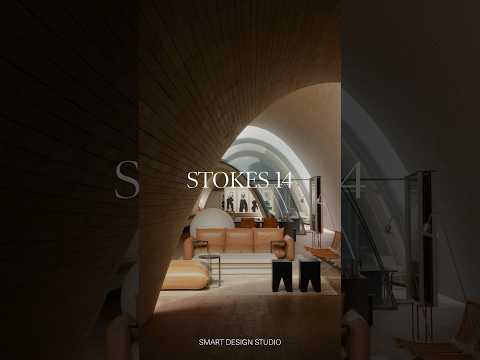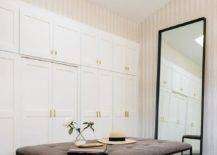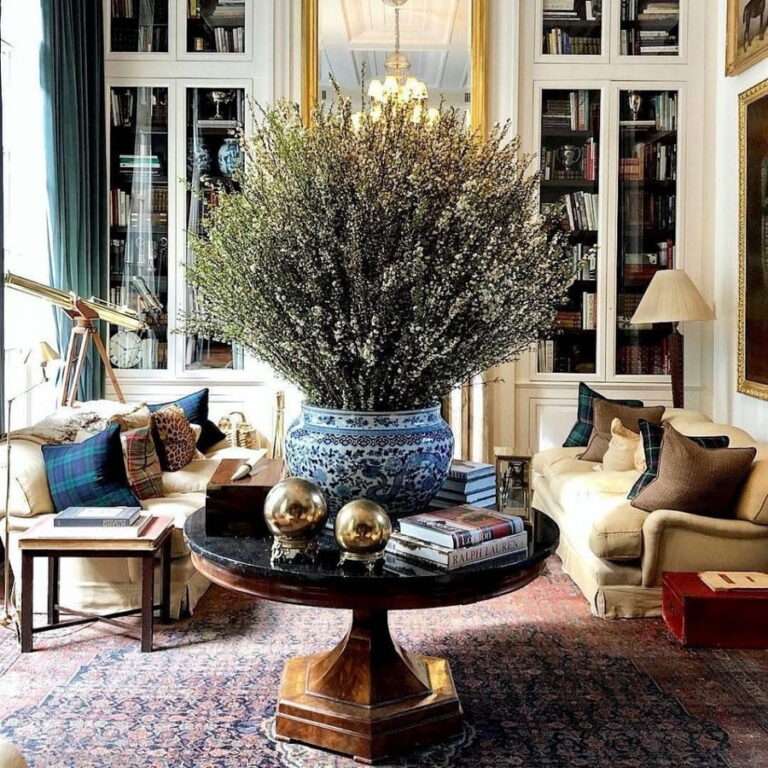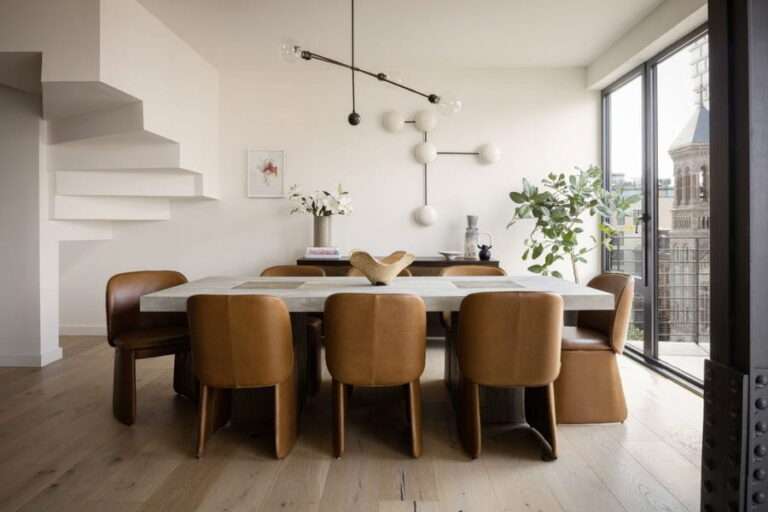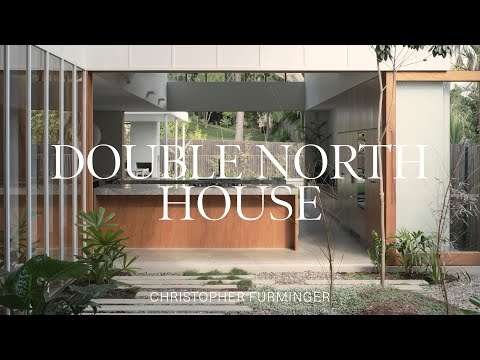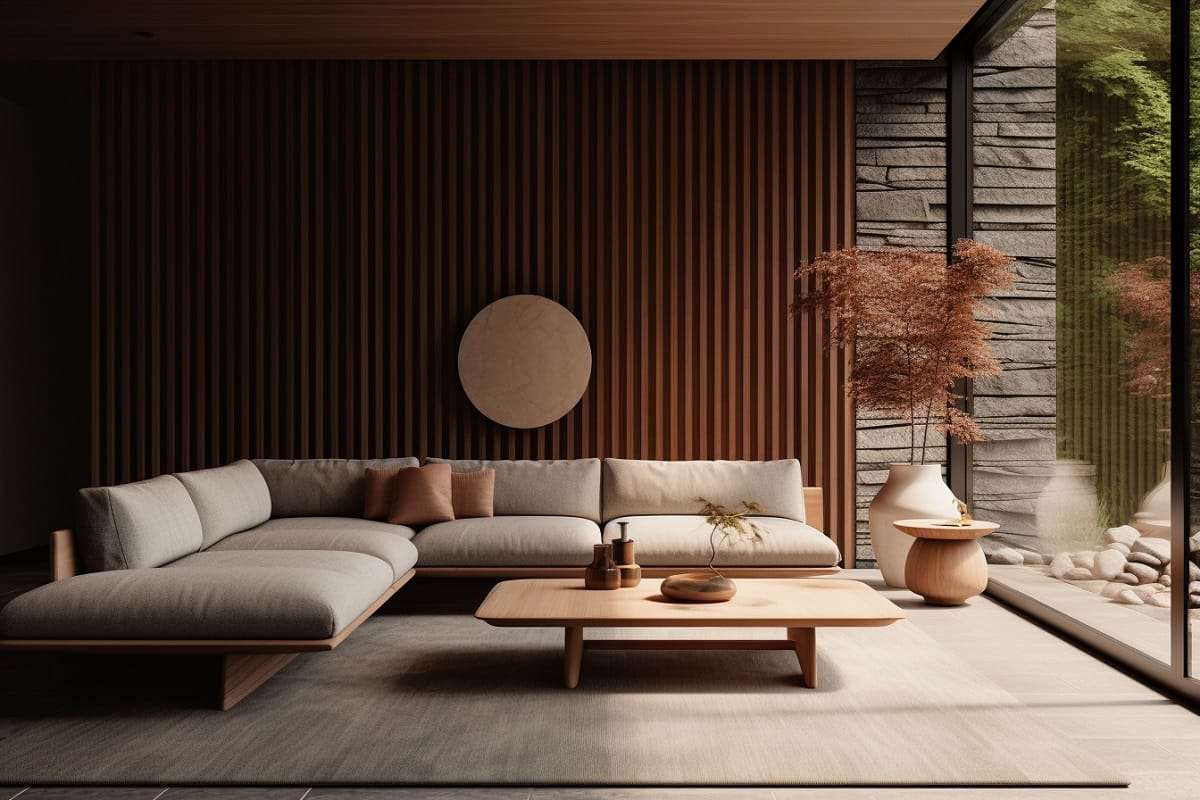
Decorilla wabi-sabi interior design ideas
Step into a design world that celebrates the incomplete and impermanent. Wabi-sabi leads the way, highlighting imperfection, organic shapes, and a natural ambiance. It’s a refreshing take on what’s beautiful. Want to infuse your space with a truly natural allure? Let these wabi-sabi interior design ideas guide your way.
What is wabi-sabi interior design?
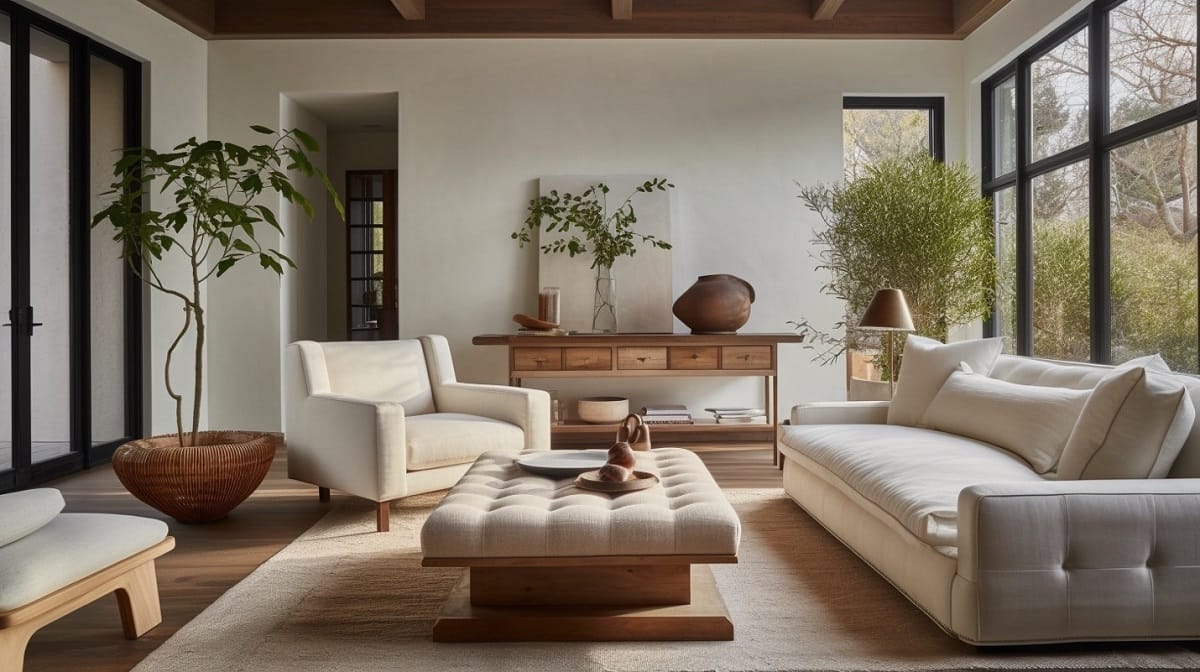
Wabi-sabi interior design ideas for a living room by Decorilla
Wabi-sabi is a way of life rooted in the Japanese philosophy of impermanence and imperfection. The principles of the organic concept come from appreciating transience in nature. As a result, the aesthetic shows serenity in simplicity and incomplete and imperfect form. Expect to see plenty of natural and authentic materials showing the passage of time.
Not sure if wabi-sabi interior design matches your style? Then try our Free Interior Design Style Quiz to find your true decorating style!
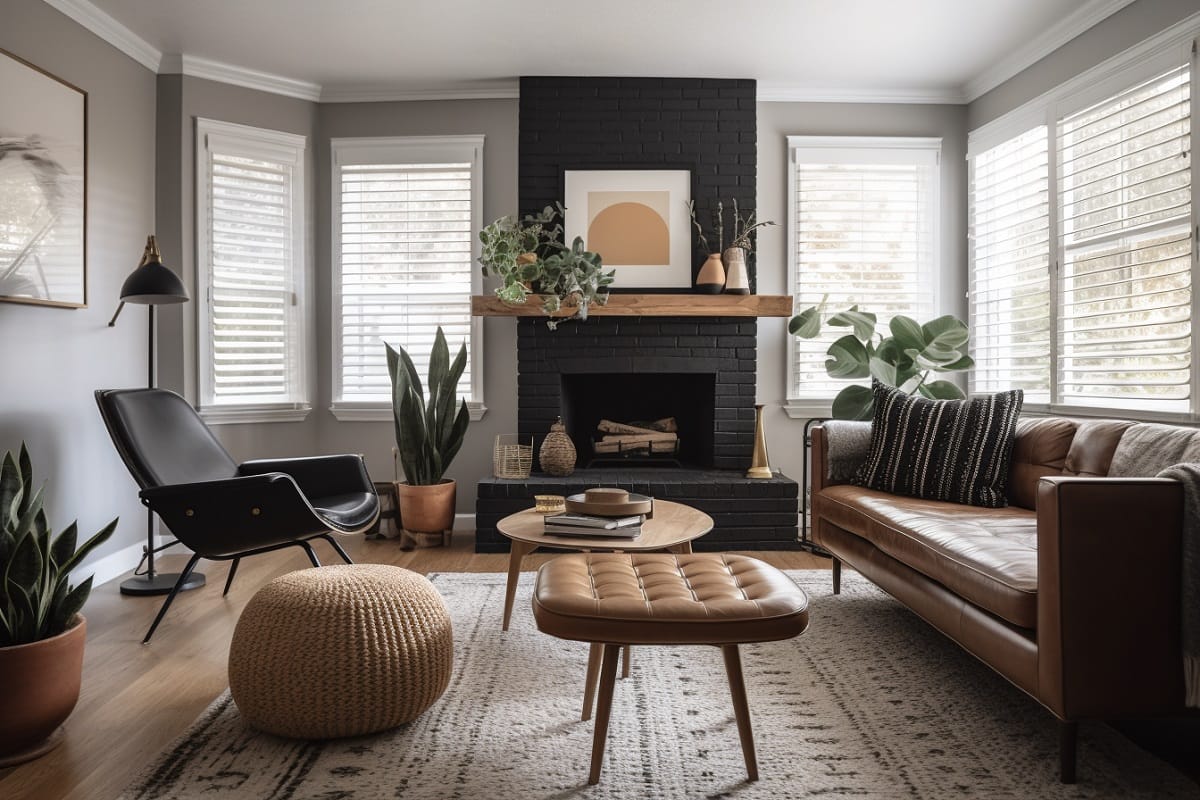
Modern interior with a wabi-sabi decor style by Decorilla
The main aspects of wabi-sabi interior design ideas include:
- Aged and Weathered Materials: Heirlooms, antiques, and naturally aged materials are vital aspects of a wabi-sabi interior, especially those that develop patina and wear over time.
- Simplicity: These interiors have a warm minimalist design, focusing on essentials and eliminating excess. Keep in mind that wabi-sabi interiors feel intimate despite a minimal style.
- Unconventional Beauty: Embrace the beauty of imperfections, like cracked ceramics or uneven textures. In line with wabi-sabi design, the Japanese art of Kintsugi highlights cracks by sealing repairs with gold lacquer.
- Natural Elements: Since the natural world inspired the concept of wabi-sabi, adding natural items is a must. Think houseplants, organic fabrics, stone, and wood.
Wabi-Sabi Interior Design Ideas: Soothing Organic
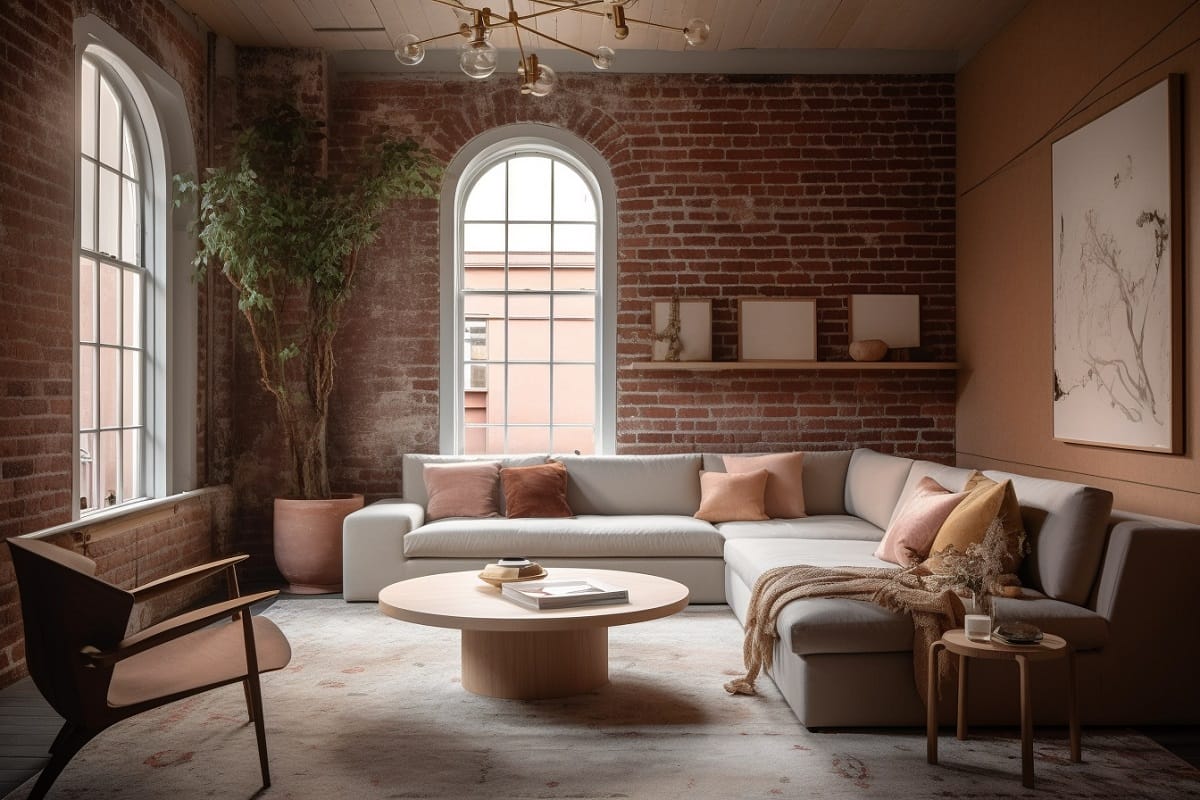
Industrial wabi-sabi living room by Decorilla
Creating a seamless fusion of natural home decor and understated elegance is easy with some help. So, let’s delve into wabi-sabi interior design and ideas that will help you curate a space that embodies this serene aesthetic.
1. Embrace Minimalism for a Wabi-Sabi Living Room
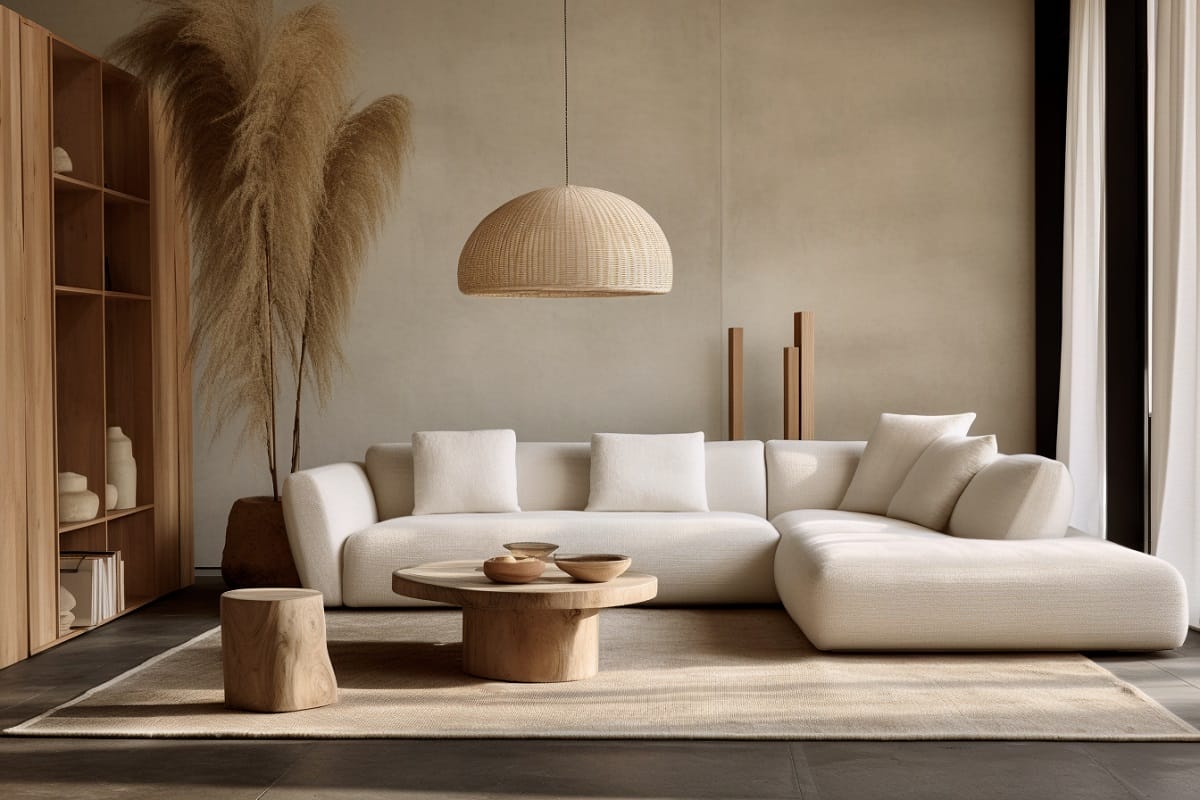
Minimalist wabi-sabi interior design ideas by Decorilla
Wabi-sabi living rooms embody a warm minimalist undertone. Start your design with a neat floor plan and thoughtful placement. Incorporate simple, unadorned furniture, an earthy color palette, and natural textiles for a tranquil ambiance. Add final touches of wabi-sabi through handcrafted ceramics and a rough-hewn wooden coffee table.
2. Decorate Meaningfully with Unearthed Treasures
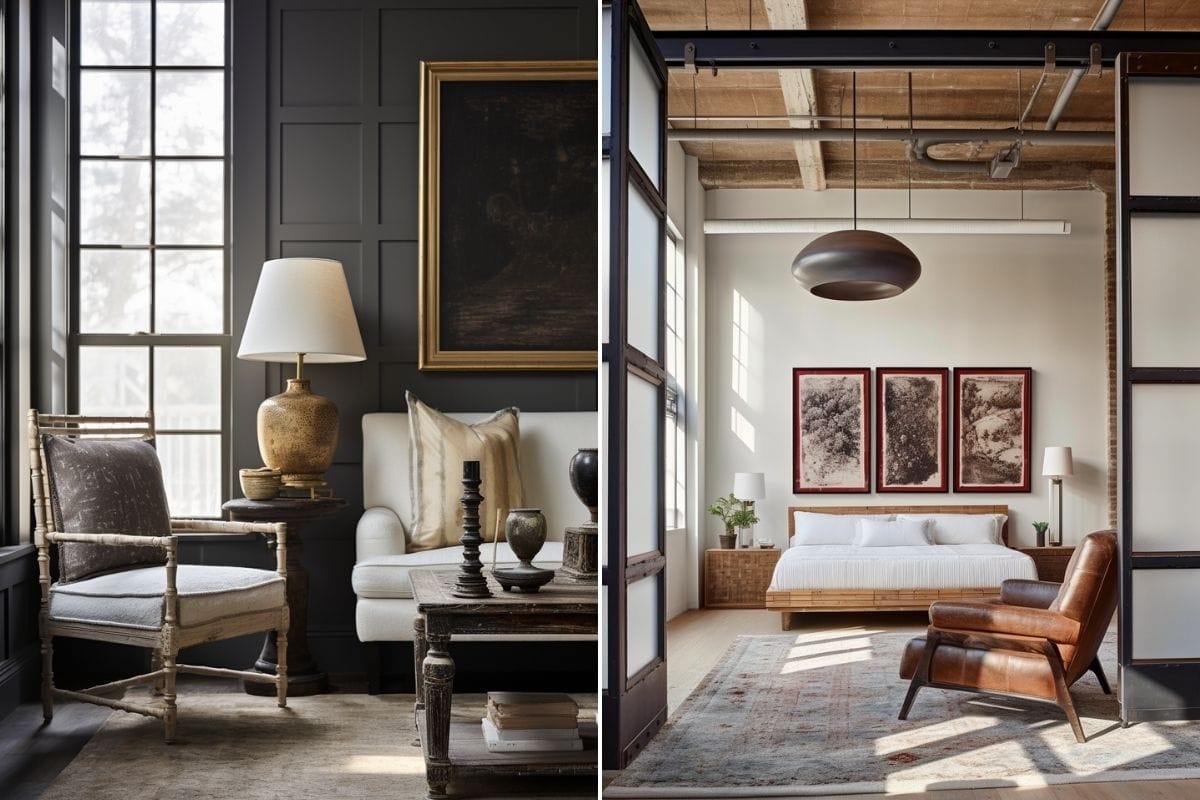
Wabi-sabi décor in a living room and bedroom by Decorilla
Antique furniture or decor gives these interiors character and depth. One or two accents will connect a present-day interior with the past, essential to a transient space. So include wabi-sabi decor, specifically objects that have a history, mindfully. This can consist of vintage mirrors with weathered frames or handwoven rugs that tell a story. Make them the focus by keeping surrounding decor to a minimum.
3. Simple Coziness in the Bedroom
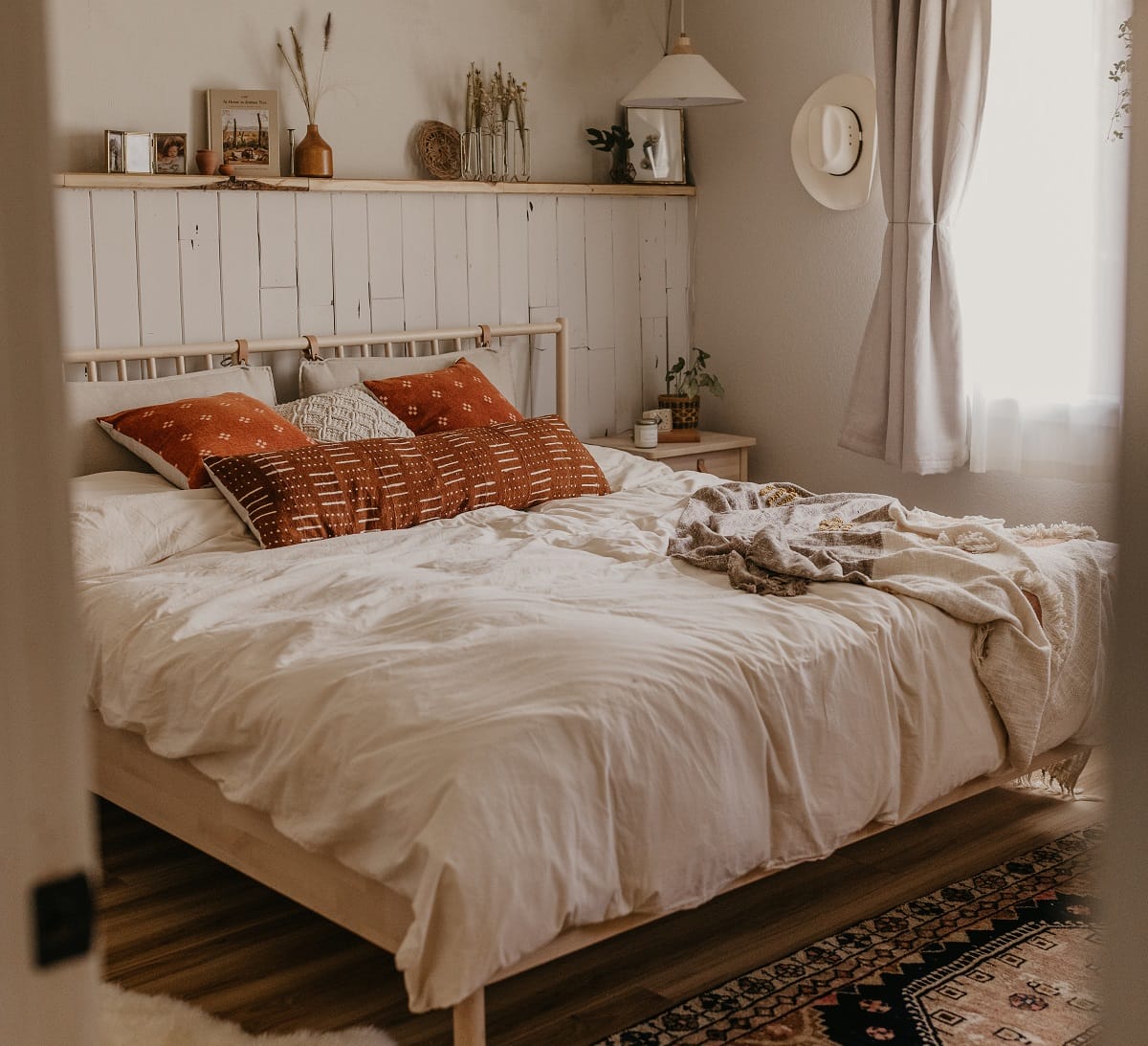
Cozy wabi-sabi bedroom interior design by Decorilla designer, Sonia C.
Wabi-sabi bedrooms are undeniably soothing. Create a peaceful interior with a low platform bed, muted colors, and soft, organic bedding. Integrate nature with potted plants and use reclaimed wood for furniture. You can also infuse a sense of serenity through minimalistic artwork.
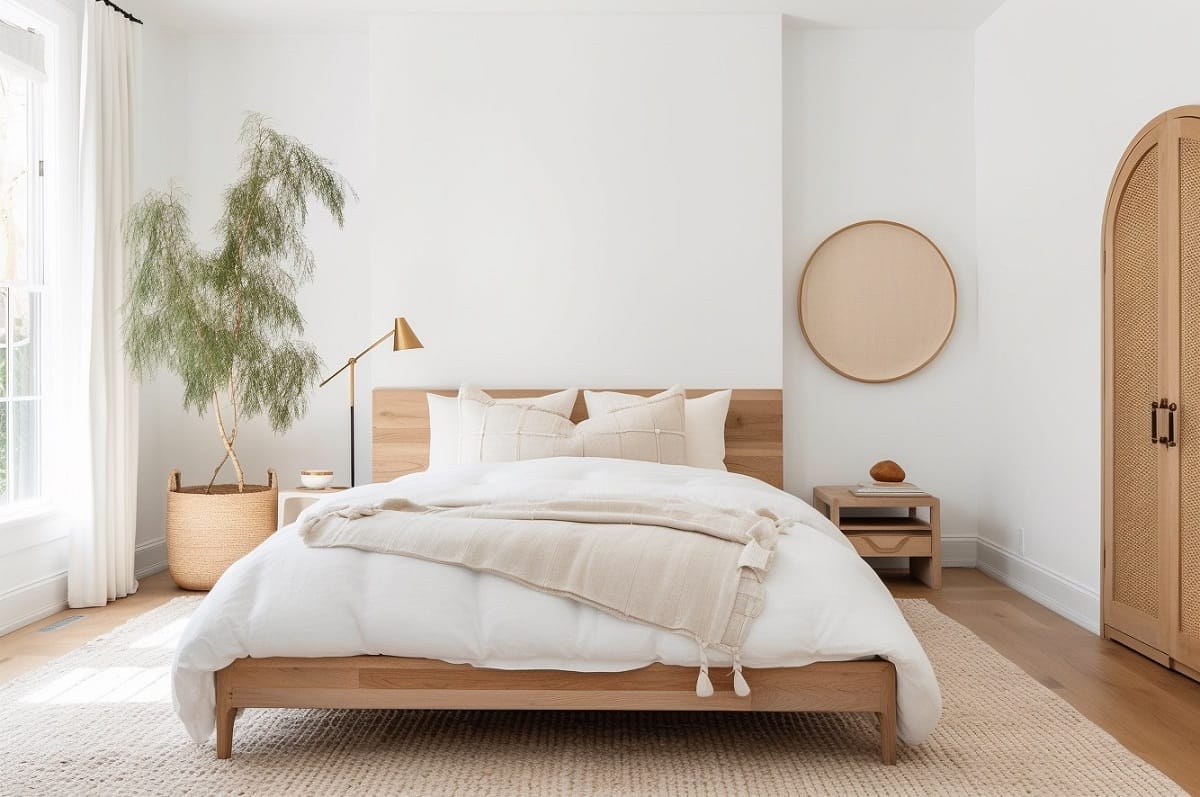
Uplifting wabi-sabi style bedroom style by Decorilla
Complete the style with a single, carefully chosen antique piece that aligns with the wabi-sabi philosophy of embracing the beauty found in imperfections.
4. Less Gives More Space for Your Wellbeing
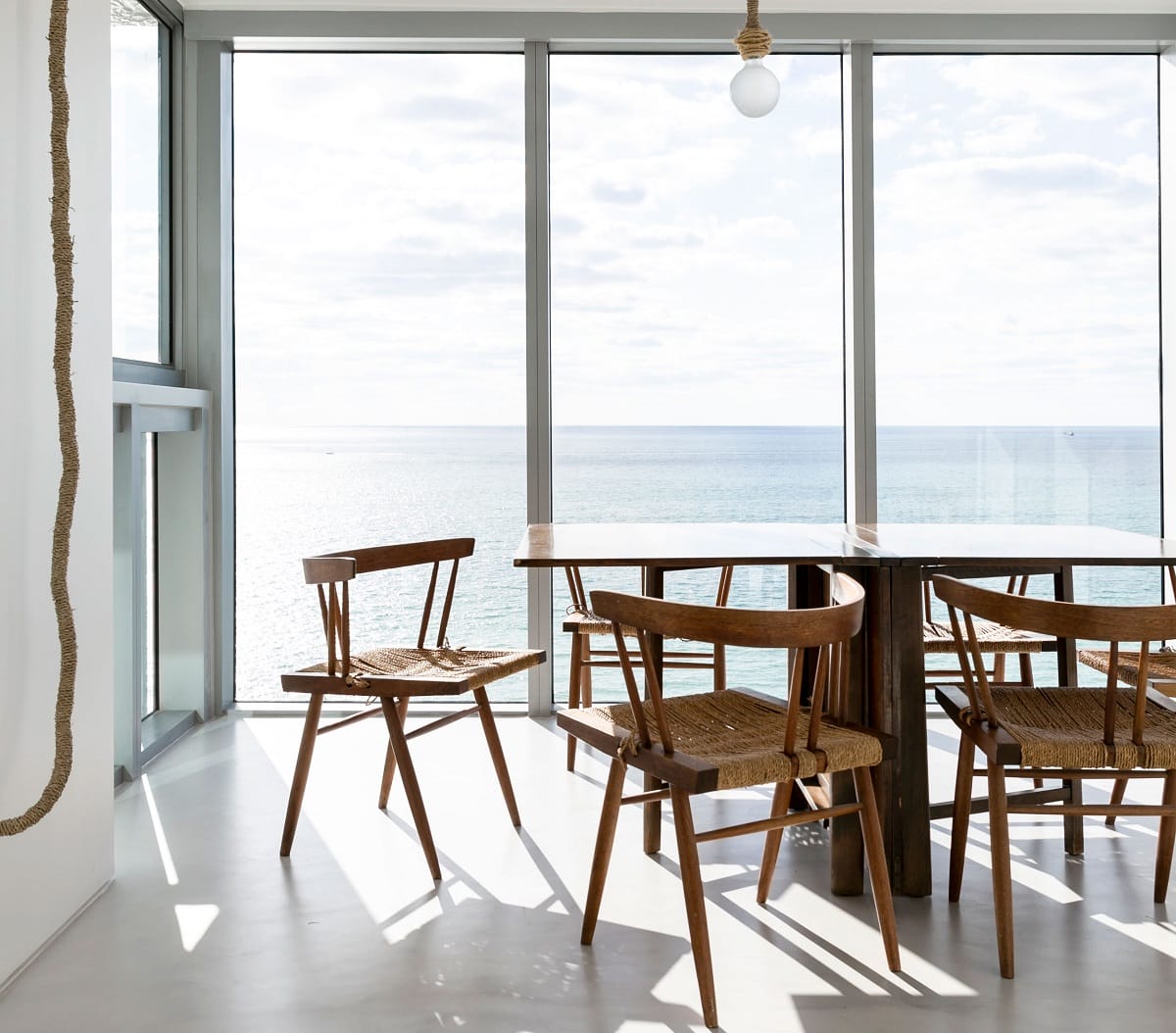
Serene wabi-sabi dining room by Decorilla
Clean, simple, and organized – minimalist wabi-sabi interior design lets you focus on what’s important. So, take a less-is-more approach by decluttering your space. Choose storage and furniture and with unfussy silhouettes and neutral tones to maintain simplicity and balance.
5. Weathered Elegance Spice Up Simplicity
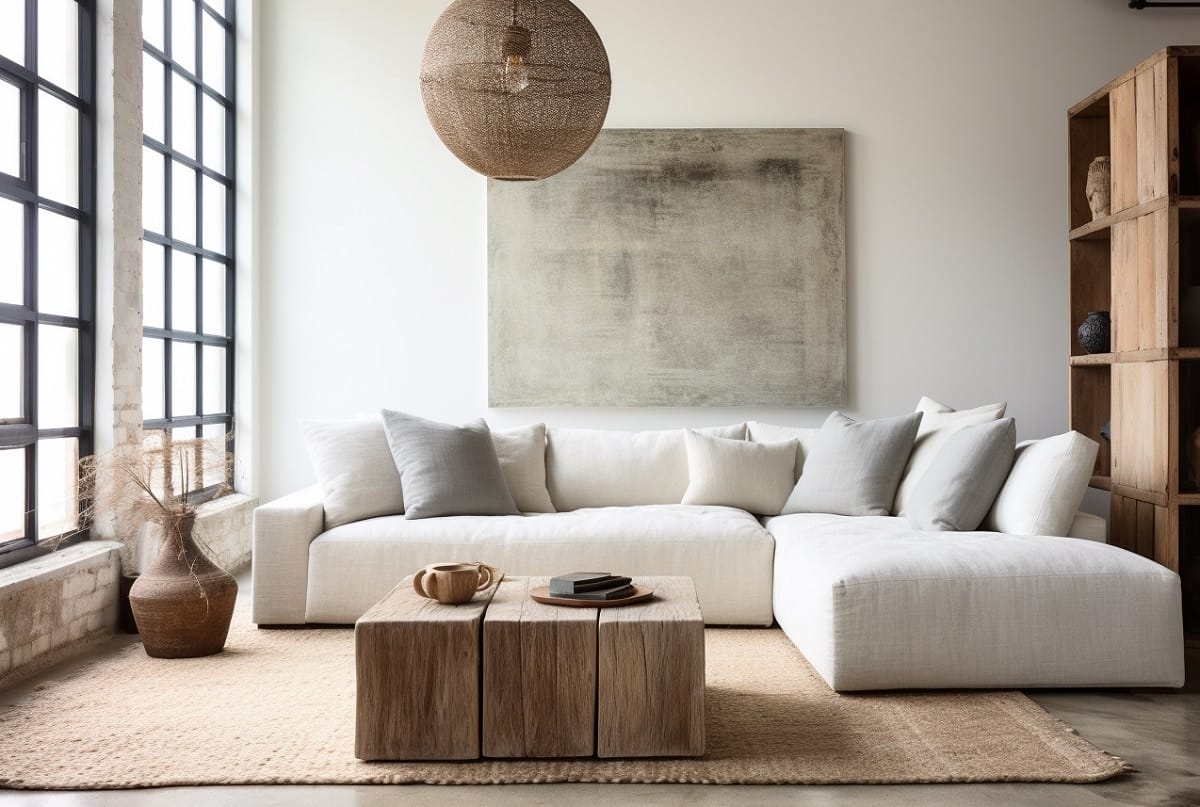
Industrial wabi-sabi living room by Decorilla
Though weathered, wabi-sabi home decor is refined and tasteful. Pick worn or aged pieces that can stand the test of time. Think a reclaimed wooden dining table, antique brass fixtures, or patinaed vases. These items bring a sense of history to your home.
6. Natural Textures are a Must for a Wabi Sabi Design Style
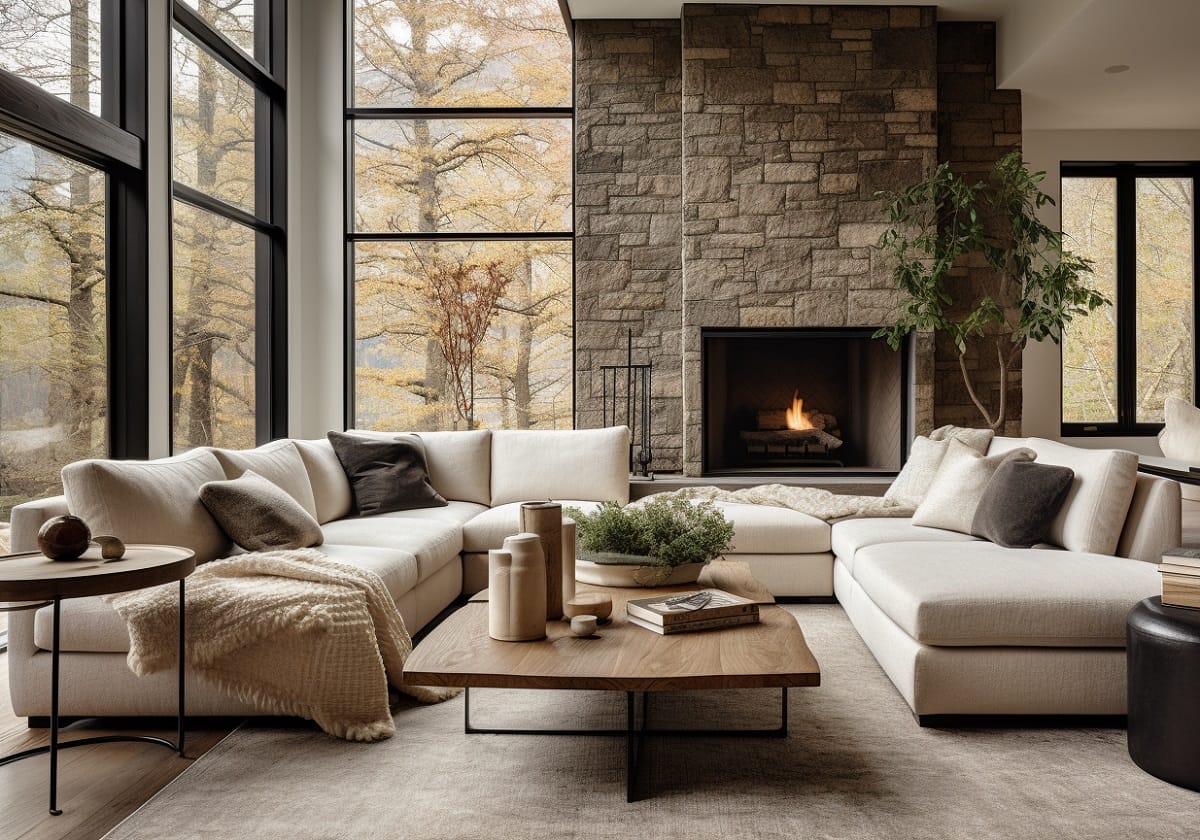
Rustic wabi-sabi living room home decor by Decorilla
Go tactile-rich for your wabi-sabi design style. Embrace natural textures like linen curtains, sisal rugs, woolen throw pillows, and bamboo blinds. These textures create a sensory experience that connects you to the earth.
7. Inviting Rustic Wabi-Sabi Kitchen Decor
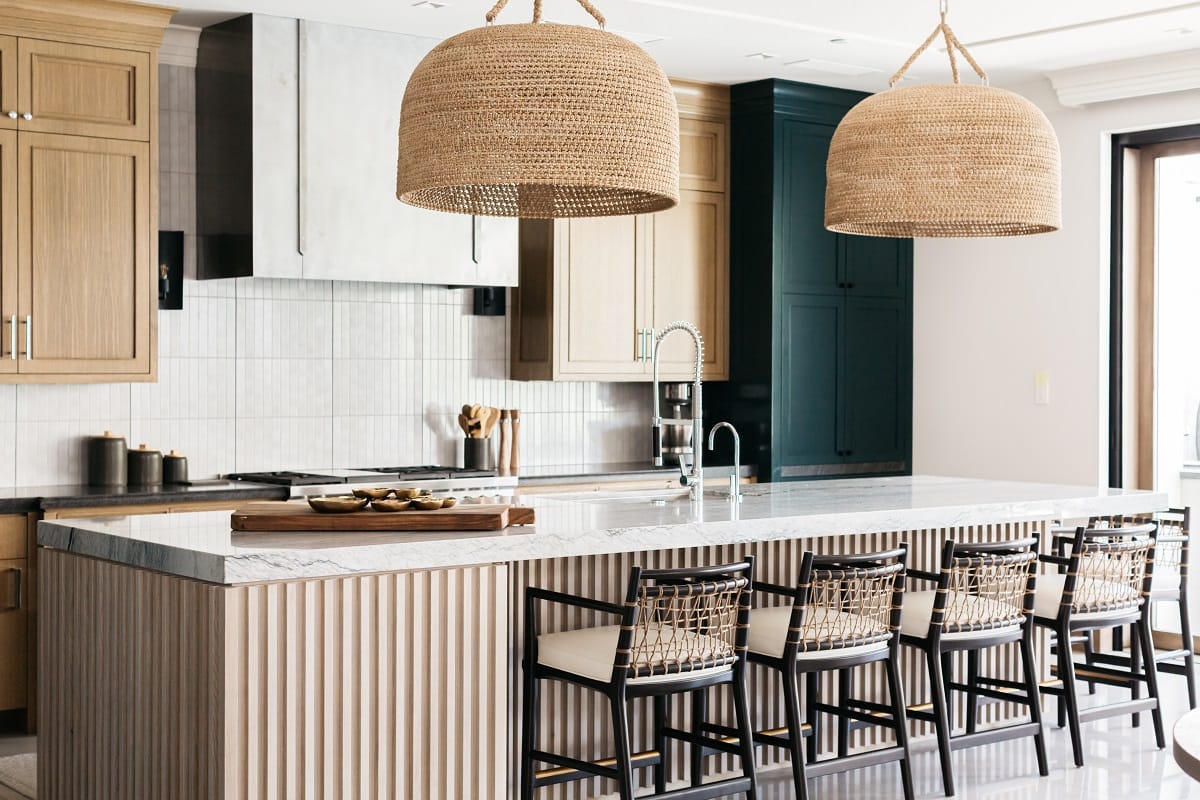
Contemporary wabi-sabi kitchen by Decorilla designer, Carrie F.
Typically open-plan, wabi-sabi kitchens are inviting and balance rustic and minimal design styles. Opt for a mix of open shelving to display unique and artisanal kitchenware and neat under-counter cupboards to ensure a tidy space.
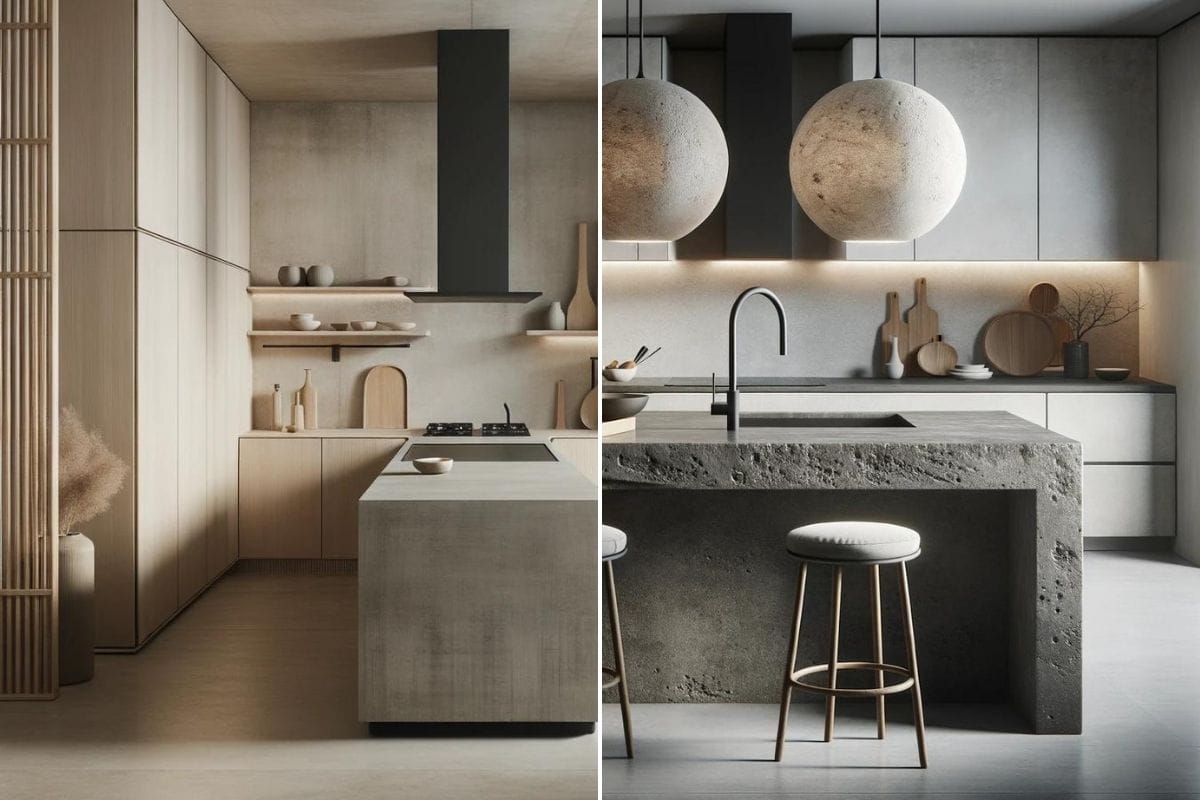
Minimalist wabi-sabi style kitchens by Decorilla
Pick rough stone countertops and handmade ceramics for plates and bowls, adding a touch of artistry to everyday life.
8. Rejuvenating Wabi-Sabi Bathroom Style
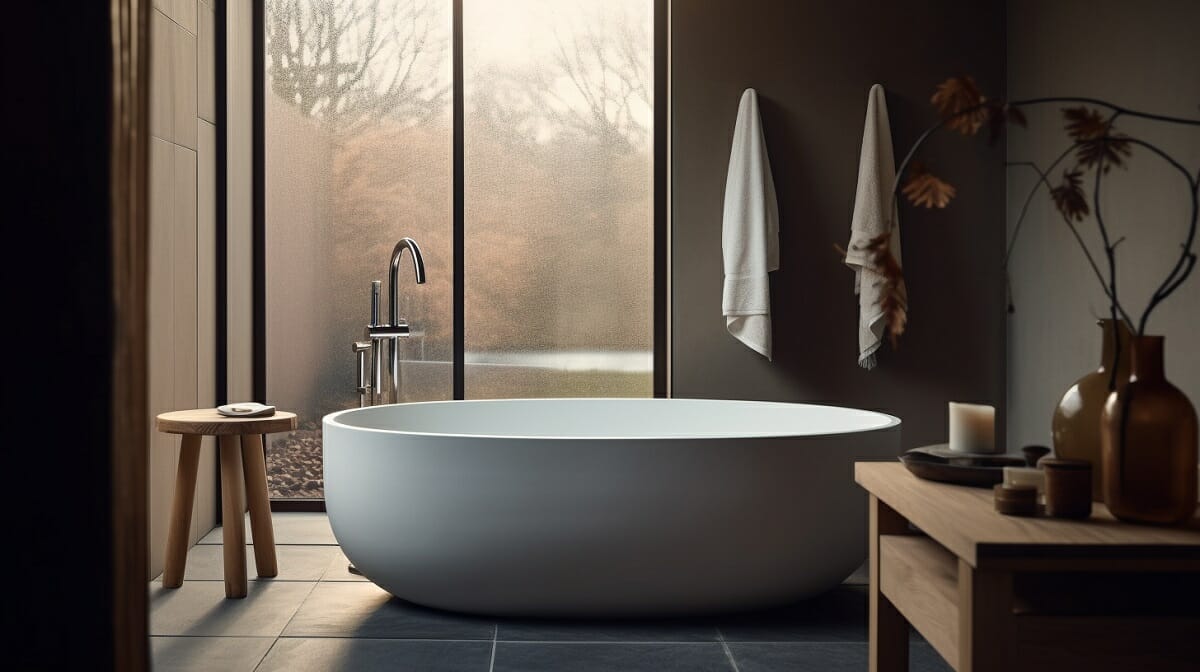
Wabi-sabi bathroom design by Decorilla
The same minimalist look reigns in a wabi-sabi bathroom style, but here, it has a cleansing and replenishing effect. Pick uplifting natural tones, stone or concrete countertops, and handmade decor like ceramic soap holders.
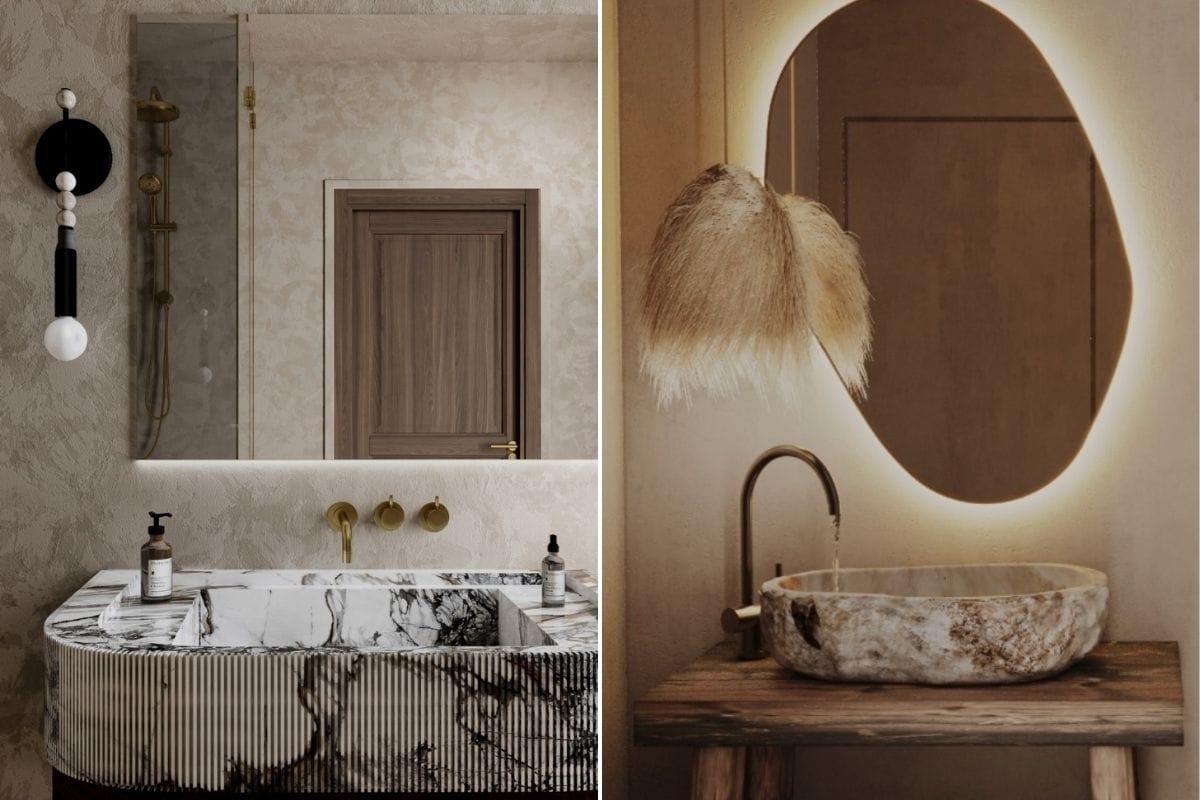
Wabi-sabi bathroom decor by Decorilla designers, Selma & Kristina B.
Add one or two potted plants to invigorate the look, but vary heights if adding more than one. One oversized indoor plant and a moisture-loving mini fern in organic pots will add a special touch.
9. Contemporary Organic Dining Room Ideas
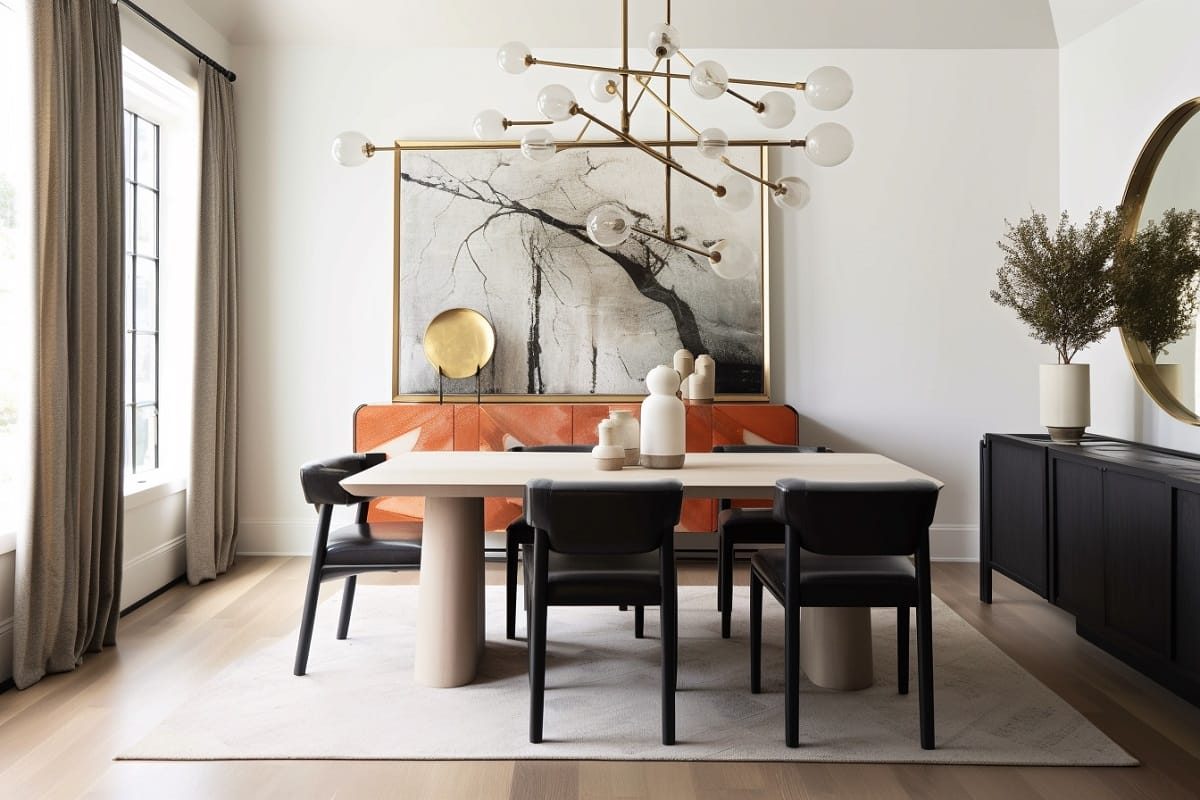
Chic wabi-sabi dining room by Decorilla
Wabi-sabi style flows all the way to dining rooms. Nod to Japanese interior design with a beautifully handcrafted dining table and contrast of light and dark furniture. You can also set your wabi-sabi dining table with simple, mismatched tableware and unpolished silverware.
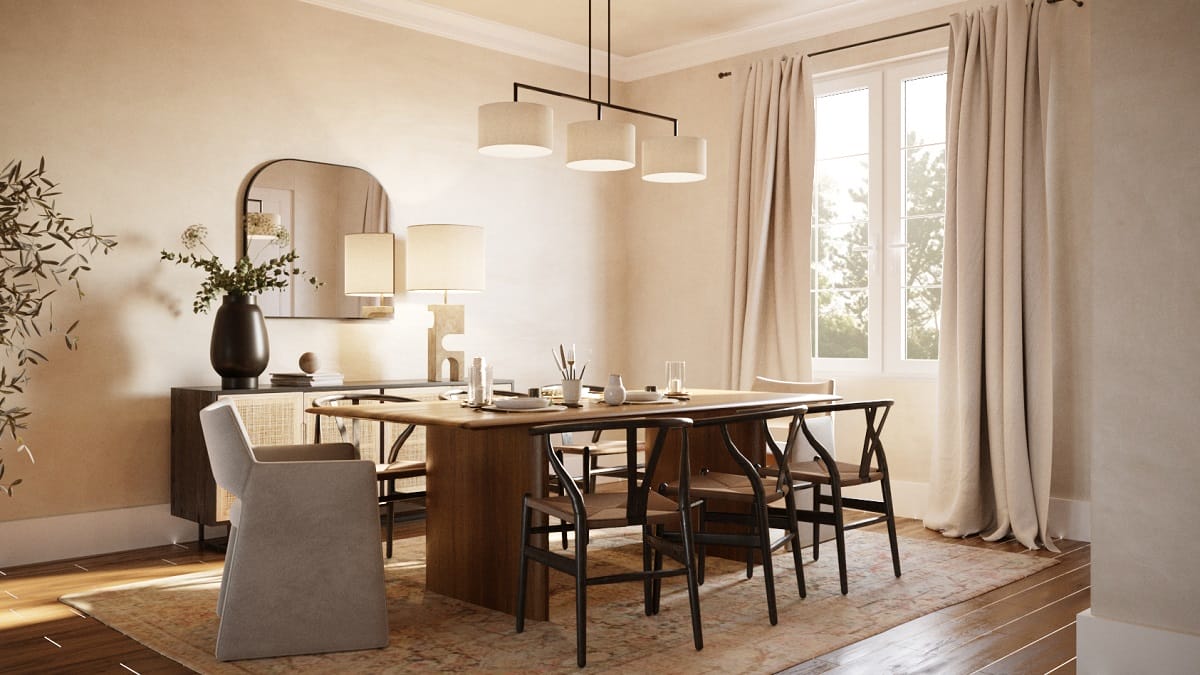
Wabi-sabi decor in a dining room by Decorilla designer, Anna Y.
Small additions, like a beautiful organic pendant or unique table lamp, can enhance the beauty of imperfection, too.
10. Unique & Soft Lighting for a Wabi-Sabi Air
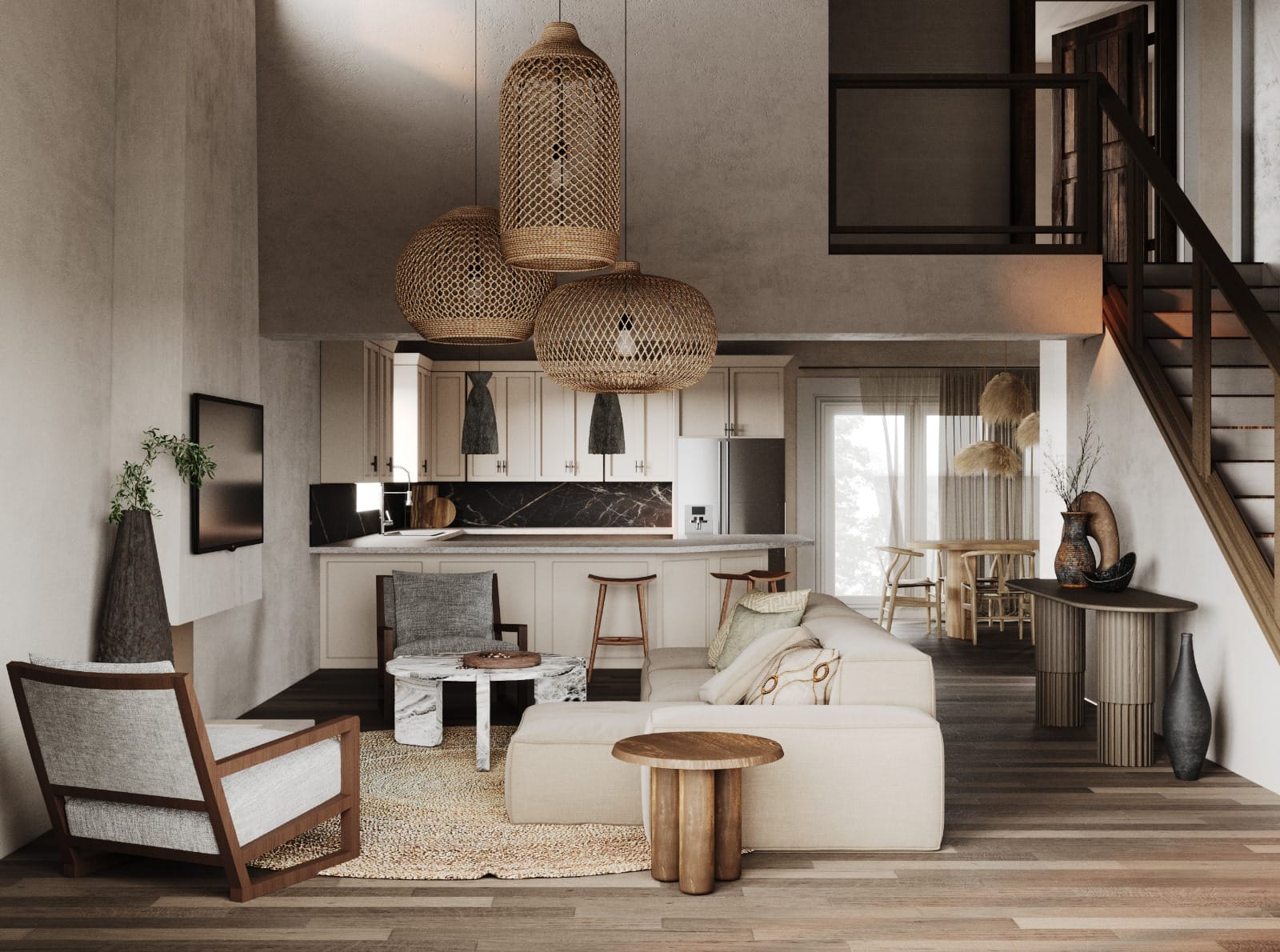
Cozy wabi-sabi living room by Decorilla designer, Kristina B.
Choose soft, diffused lighting with paper lanterns or linen lampshades. This gentle lighting will create a warm and inviting feel within your wabi-sabi interior. Keep it to the minimum by using statement lights strategically and sparingly. Think a stunning organic pendant in the living room or a delicate lantern-style table lamp in the bedroom.
11. Wabi-Sabi Art Captures Imperfect Beauty
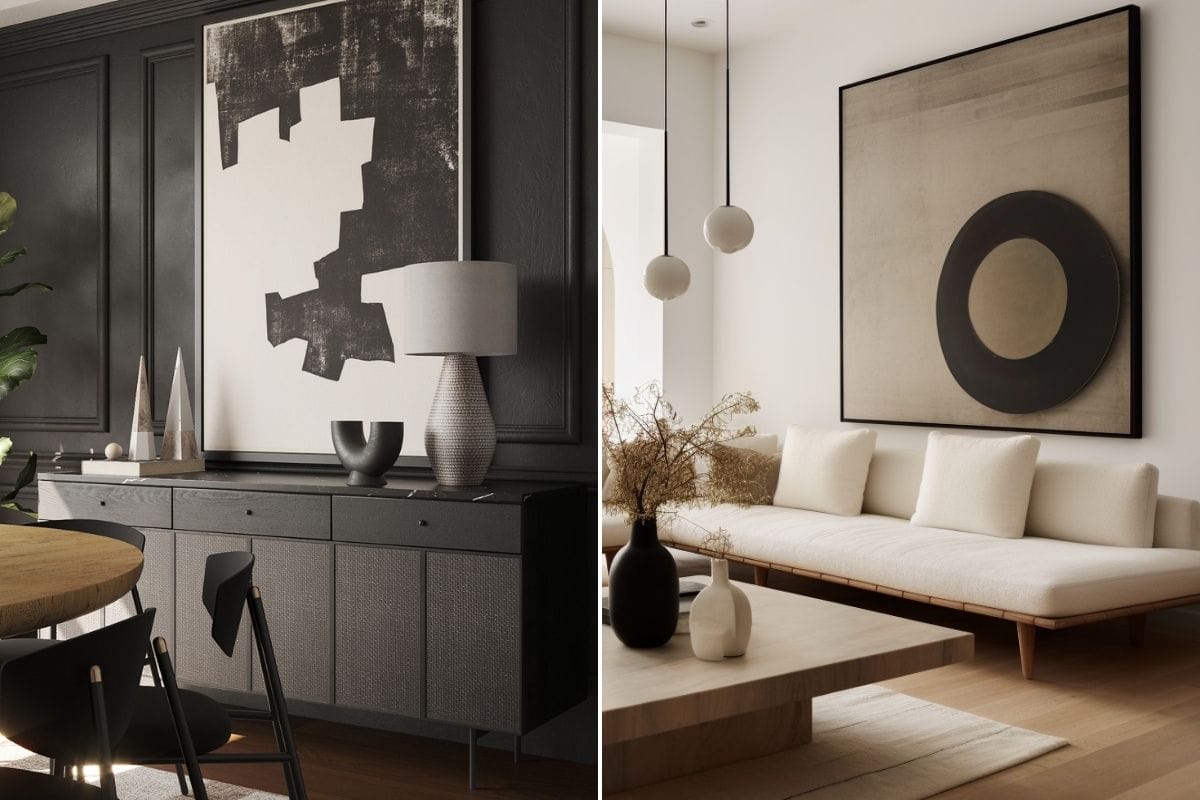
High-contrast wabi-sabi style home décor and artwork by Decorilla
Wabi-sabi design comes alive with artwork. These pieces are captivating because they contrast with expected prints and trendy decor. An all-black canvas with relief swirls, unique nature-inspired abstracts with subtle flaws, or irregularly shaped sculptures reflect the imperfect beauty of wabi-sabi.
12. Nature-Inspired Wabi Sabi Colors
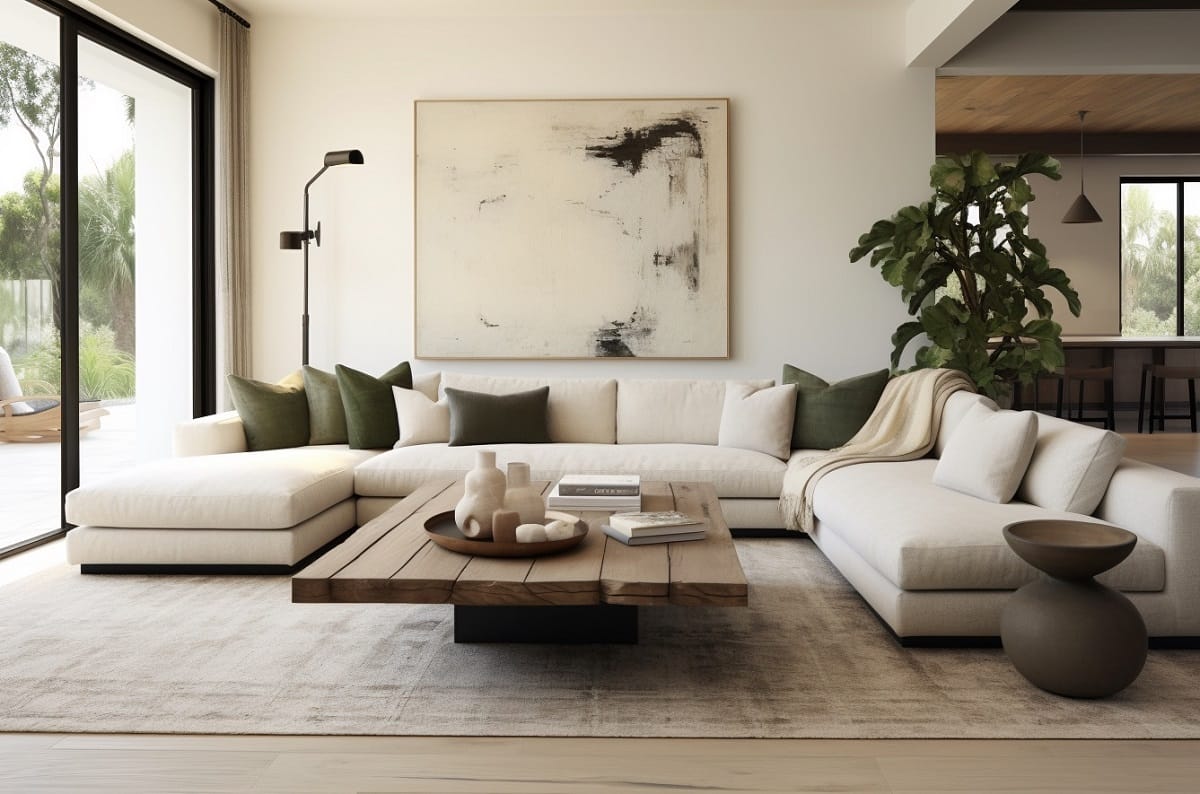
Neutral wabi-sabi style home by Decorilla
Keep your color palette muted and earthy, focusing on shades like sandy brown, gray, burnt orange, and saturated green. Dark neutrals, white, and black also feature often. These wabi-sabi colors set a calming and harmonious tone, synonymous with a classic nature-inspired interior.
13. Thoughtful Concealment & Storage
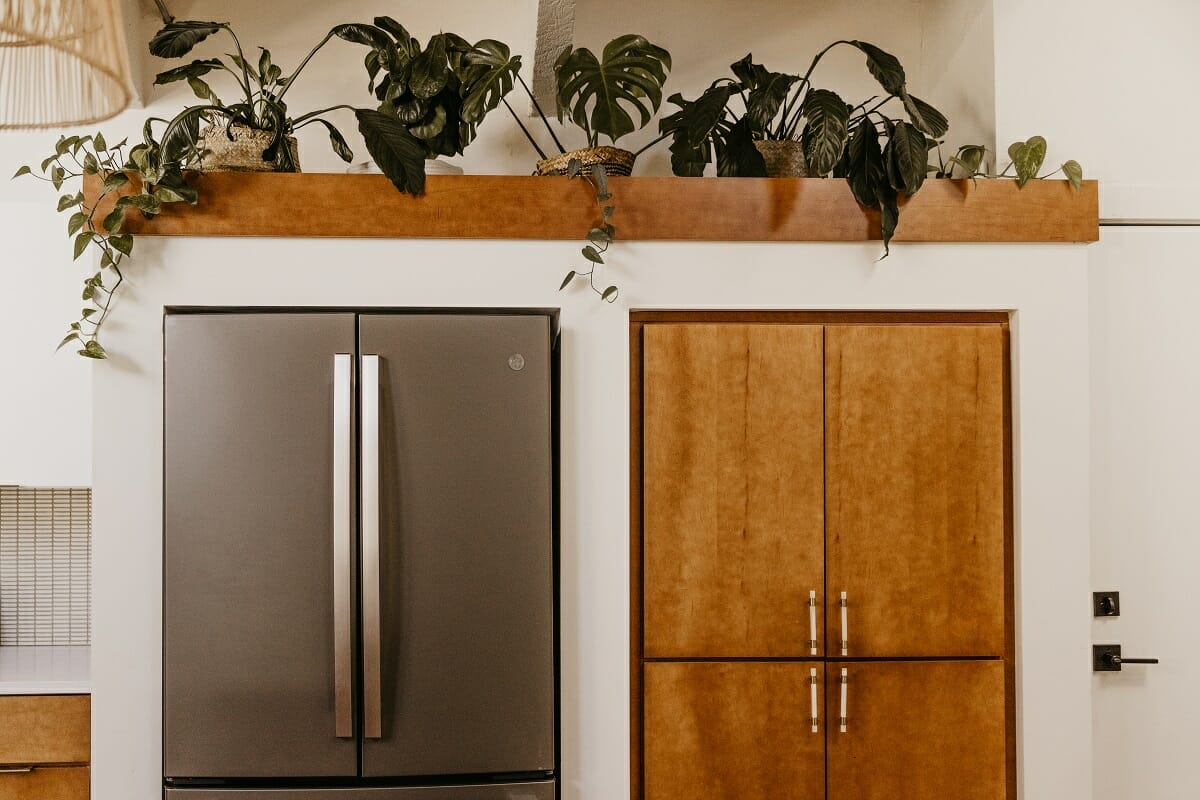
Wabi-sabi style kitchen storage by Decorilla designer, Sonia C.
Incorporate wabi-sabi storage that blends seamlessly with your home’s aesthetic. Use handwoven baskets, vintage trunks, built-in storage nooks, and reclaimed wood shelves to keep your space neat. The right furniture can keep your interior organized while adding a touch of rustic charm.
14. Welcome Calm with a Wabi-Sabi Entryway
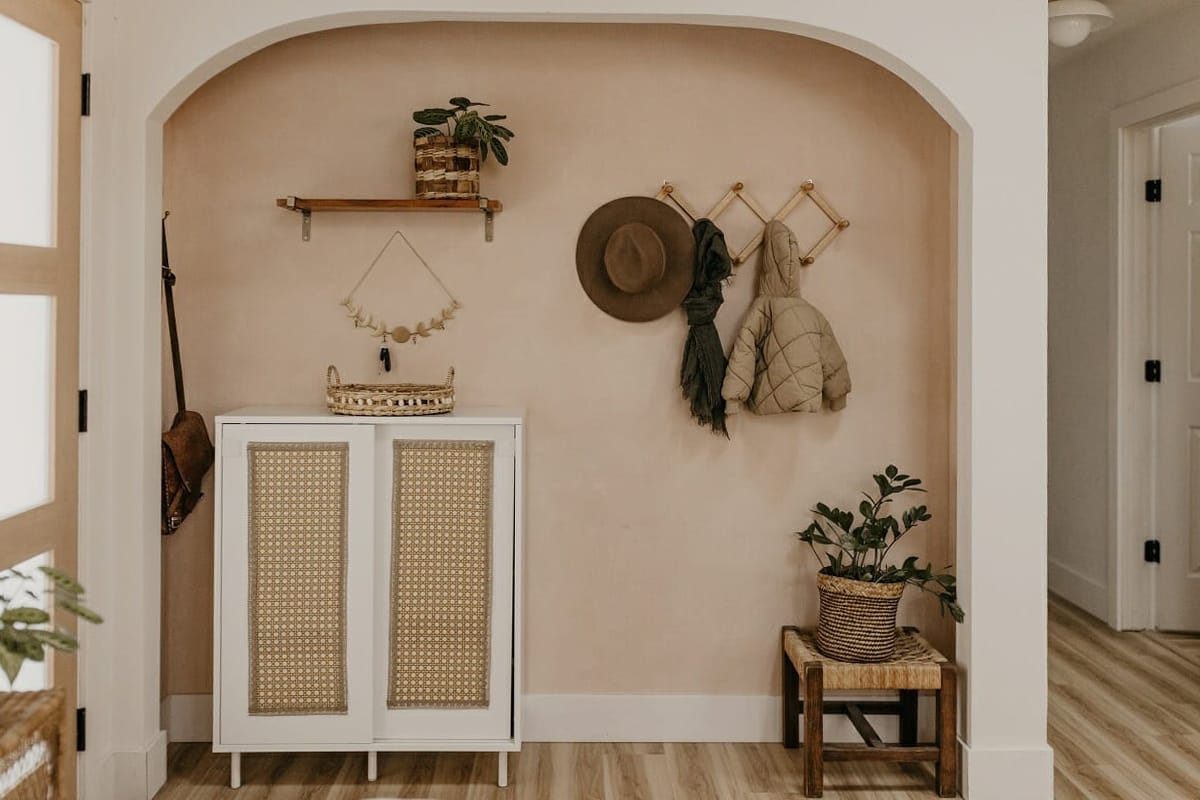
Entryway with wabi-sabi home decor by Decorilla designer, Sonia C.
Think of your wabi-sabi entryway as a tranquil transition into your home. Include a simple wooden bench, a mirror with a weathered frame, and a few potted plants. In addition, keep decor to a minimum. This allows the sense of serene simplicity to greet you and your guests.
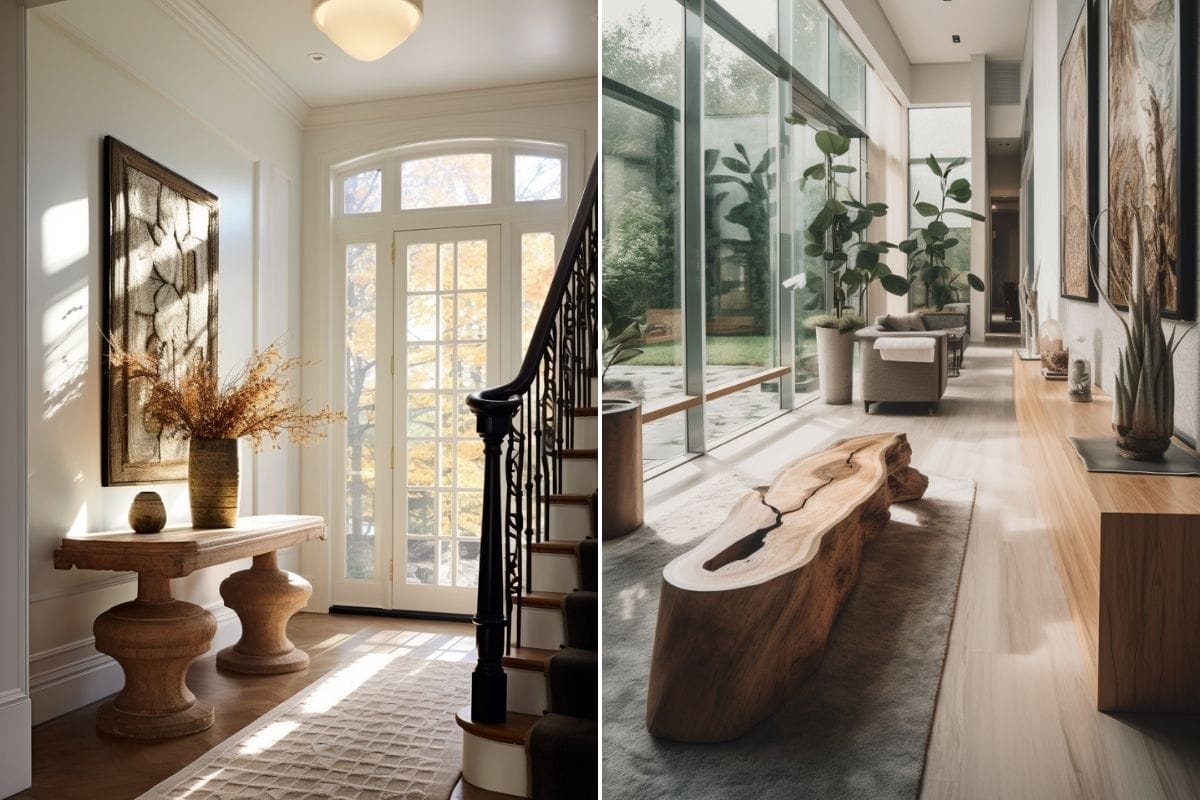
Wabi-sabi style entryways by Decorilla
Bonus Tip: Make it easy to keep your entryway tidy. Include minimal coat hooks, a small credenza, and a compact shelf with a bowl for odds and ends.
Wabi Sabi Design FAQ
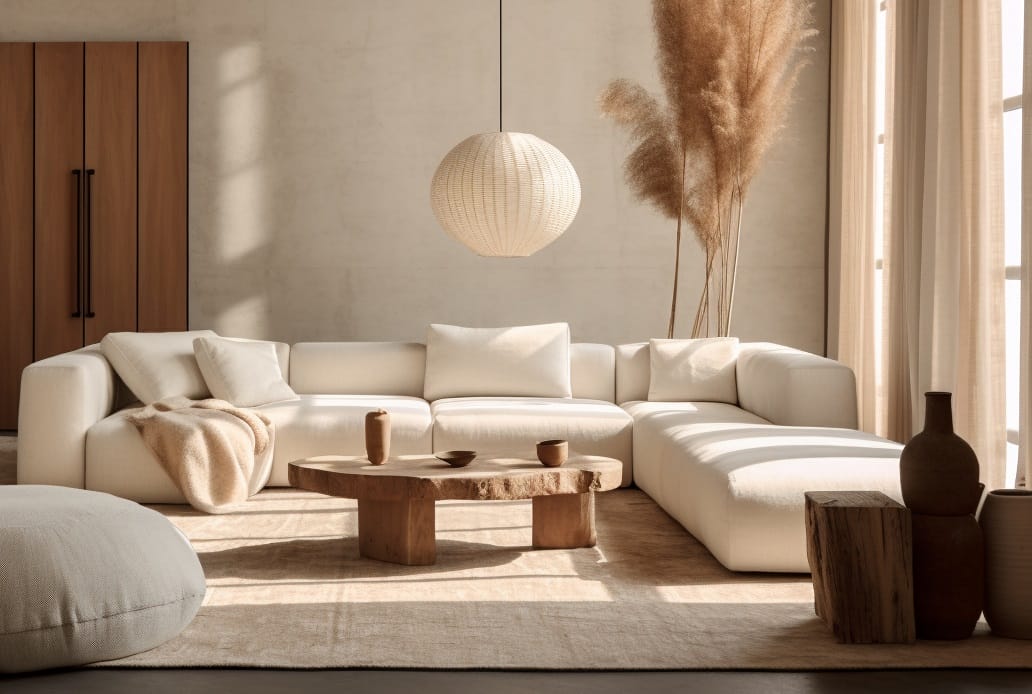
Living room with wabi-sabi home decor by Decorilla
Can I combine wabi-sabi with other design styles?
Absolutely! Wabi-sabi can complement many styles, from Scandinavian to Bohemian and even Industrial, for a unique blend of aesthetics.
How can I incorporate wabi-sabi on a budget?
Thrift stores and flea markets are excellent sources for finding affordable wabi-sabi pieces, like vintage furniture and handmade decor.
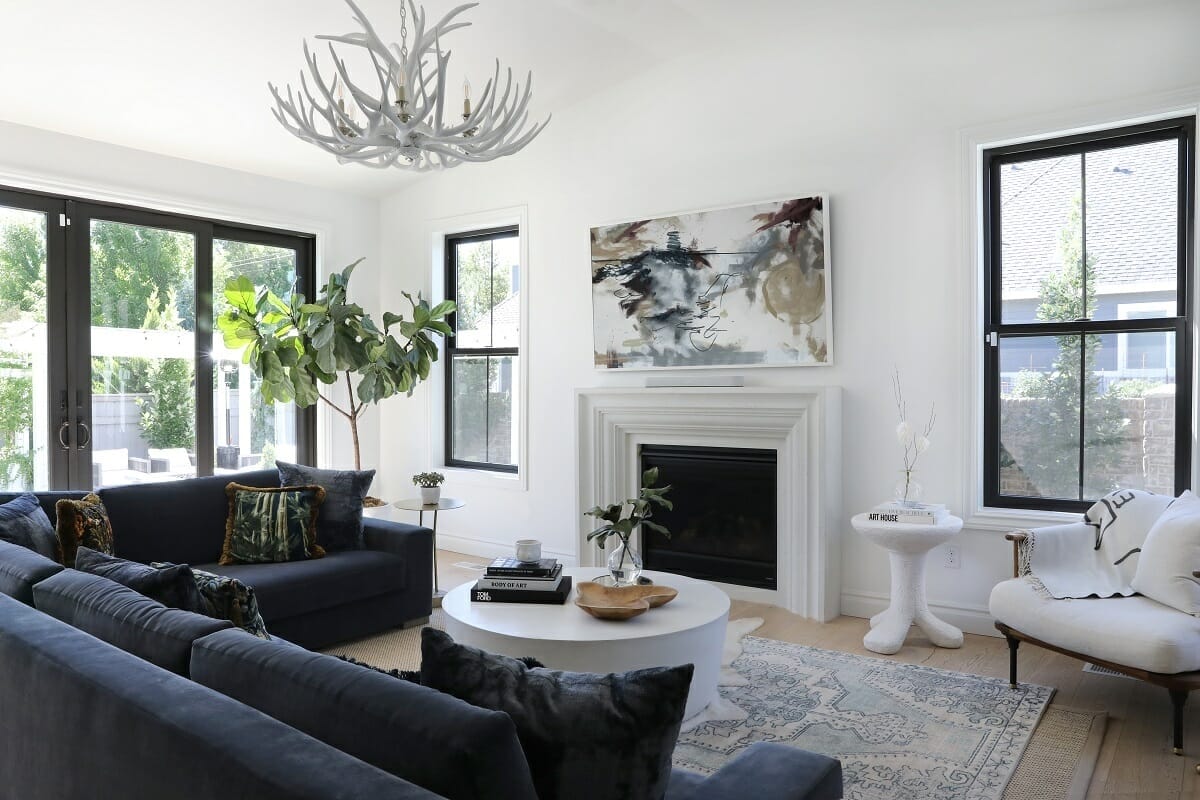
Contemporary living room with wabi-sabi decor by Decorilla designer, Jamie C.
Is wabi-sabi only for home interiors?
While Wabi-sabi design is often associated with interiors, you can apply its principles to gardens, outdoor spaces, and lifestyle choices.
Where can I find wabi-sabi-inspired decor items?
Look for crafters markets, local artisans, and online marketplaces to discover handcrafted Wabi Sabi pieces that resonate with your style.
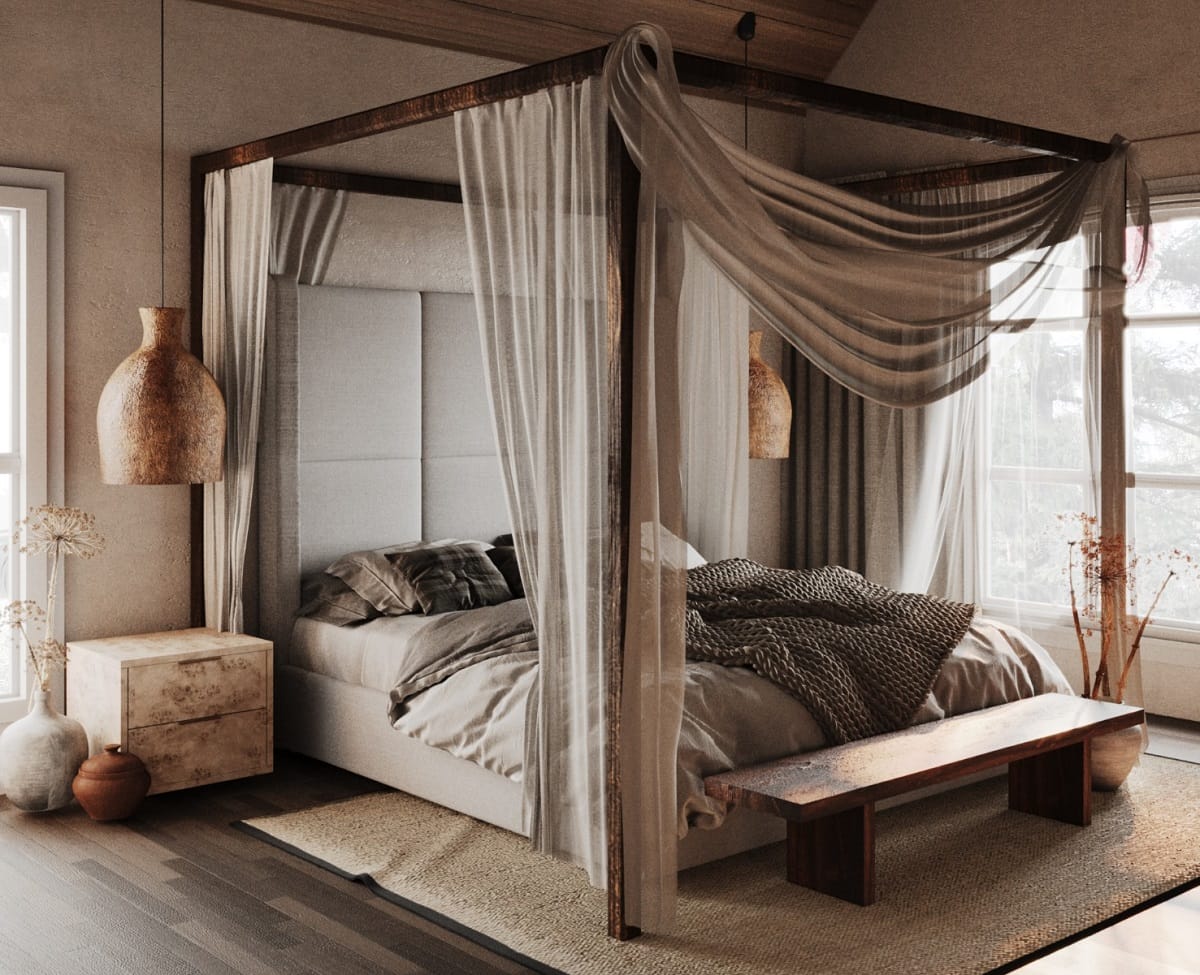
Wabi-sabi interior design ideas by Decorilla designer, Kristina B.
What materials are used in wabi-sabi interior design?
Wabi-sabi design relies heavily on natural and raw materials that tell a story. The most prominent materials are stone, wood, clay, exposed concrete, and textured textiles like jute, linen and wool.
What are the elements in wabi-sabi?
A wabi-sabi style reflects a connection with nature. For this reason, raw and rough textures, intimate settings, asymmetry, and vintage accents often make up its elements.
Ready to create your own wabi-sabi interior design?
Incorporating wabi-sabi into your home is a journey of mindfulness and appreciation for the beauty of simplicity and imperfection. Start today by scheduling a Free Interior Design Consultation and watch your space transform into a tranquil oasis!

